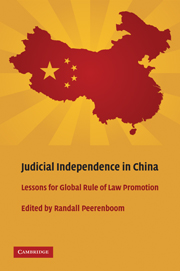Book contents
- Frontmatter
- Contents
- Contributors
- 1 Introduction
- 2 Halfway Home and a Long Way to Go
- 3 A New Approach for Promoting Judicial Independence
- 4 The Party and the Courts
- 5 Judicial Independence in China
- 6 A New Analytic Framework for Understanding and Promoting Judicial Independence in China
- 7 Judicial Independence and the Company Law in the Shanghai Courts
- 8 Local Courts in Western China
- 9 The Judiciary Pushes Back
- 10 Corruption in China's Courts
- 11 A Survey of Commercial Litigation in Shanghai Courts
- 12 Judicial Independence in Authoritarian Regimes
- 13 Judicial Independence in East Asia
- Index
- References
6 - A New Analytic Framework for Understanding and Promoting Judicial Independence in China
Published online by Cambridge University Press: 05 June 2012
- Frontmatter
- Contents
- Contributors
- 1 Introduction
- 2 Halfway Home and a Long Way to Go
- 3 A New Approach for Promoting Judicial Independence
- 4 The Party and the Courts
- 5 Judicial Independence in China
- 6 A New Analytic Framework for Understanding and Promoting Judicial Independence in China
- 7 Judicial Independence and the Company Law in the Shanghai Courts
- 8 Local Courts in Western China
- 9 The Judiciary Pushes Back
- 10 Corruption in China's Courts
- 11 A Survey of Commercial Litigation in Shanghai Courts
- 12 Judicial Independence in Authoritarian Regimes
- 13 Judicial Independence in East Asia
- Index
- References
Summary
This chapter develops a new analytical framework for understanding and promoting judicial independence in China. As noted in the previous chapter, general denunciations of the “lack” of (meaningful) independence in China do not capture the complexity of the situation. Attributing the lack of meaningful independence primarily if not exclusively to the nature of the political system also misstates and overstates the role of the party and ignores more common sources of pressure on the courts. The likely source of interference, the risk of interference, and the impact of interference all differ depending on the type of case.
Given the diverse nature of the problems, there is no single solution – no silver bullet – that will ensure meaningful judicial independence in China (whatever that means in light of the substantive disagreements about how independent courts should be at this stage of development). Reforms to facilitate judicial independence must be tailored to the particular circumstances and include a wide range of changes that affect not just the judiciary as an institution but substantive and procedural law, the balance of power among state organs, party–state relations, and social attitudes and practices. Judicial independence is, however, not an end itself, and the courts are not the sole, most effective, or most appropriate venue for resolving all disputes. Thus, we also provide policy recommendations for each type of case, including in some cases recommendations that emphasize nonjudicial mechanisms for resolving certain issues or that limit judicial independence in an effort to reduce corruption, promote sociopolitical stability, and enhance justice and judicial accountability.
- Type
- Chapter
- Information
- Judicial Independence in ChinaLessons for Global Rule of Law Promotion, pp. 95 - 133Publisher: Cambridge University PressPrint publication year: 2009
References
- 5
- Cited by



